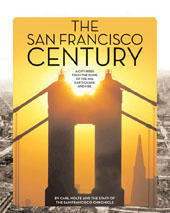
Champagne will flow tonight at a writer-heavy screening of The Prize Winner of Defiance, Ohio. The movie, starring Julianne Moore and Woody Harrelson, is based on the best-selling memoir by San Francisco writer Terry Ryan.
Ryan’s book tells the story of her mother Evelyn, who raised 10 children in the 1950s and kept her family out of poverty by writing prize-winning jingles for American companies.
“Gently, affectionately and with wit, this lovely movie gives the 1950's its due, but not for a moment does it go overboard and make you want to go back there,” writes New York Times movie critic Stephen Holden.
It is a bittersweet time for Ryan. While she is gratified that her memoir is now a movie, she is battling cancer. "Exciting times. The best and worst of times are happening at once. But what are you gonna do?" Ryan told the Chronicle in a recent feature story.
After Friday’s sold-out screening, Ryan’s friends and family will cross Van Ness Avenue to continue the celebration. Isabelle Allende will say a few words. Pat Holt, Terry’s partner and a book industry commentator will host, as will her literary agent Amy Rennert.
Rennert, one of the Bay Area’s most successful agents, was celebrating another of her author’s successes on Thursday night. She went to a gathering in Sea Cliff for a party for Robert O’Harrow and the Center for Investigative Reporting. O’Harrow, a Washington Post reporter, wrote No Place To Hide with the support of CIR.
The book sheds light on the murky, disturbing world where private data and technology companies and the government have formed partnership to collect information. Since 9/11, concerns over privacy have been trumped by concerns about security and O’Harrow and the Center warn how information about every individual, from the price of their house, to the type of car they drive, to their favorite supermarket specials, is now for sale.
Phil Bronstein, the executive editor of the Chronicle, attended, as did Robert Rosenberg, the paper’s managing editor. Other’s honoring the Center’s work included Judy Alexander, CIR’s First Amendment attorney, and Tod Oppenheimer, a former Newsweek columnist and member of the Grotto, San Francisco’s writing collective.
One last note: Judy Miller is out of jail but she’s going to testify before the grand jury. I don’t get the point. I thought she was resisting the government’s attempts to name her source. Since she now has the source’s permission, she will tell all.
